Dealing with a child who hits can be a challenging and sensitive issue for parents. Working out what to do when a child hits requires a thoughtful approach that focuses on understanding and guiding our child’s behavior rather than resorting to punishment or shame.
Often discussions about what to do when a child hits relate to younger children – toddlers and preschoolers – but you can also struggle with these issues with an older child. Today I’m sharing some strategies for helping an older child (ages 5-9) who hits
These ideas for dealing with a child who hits are rooted in empathy, respect, and building a strong connection with your kids. We look at the underlying causes of hitting, try to understand our children’s emotions and share some practical ideas for working towards a healthier way of expressing themselves and dealing with their emotions.
While these strategies for helping a child who hits are aimed at older kids, if you have toddlers or preschoolers who hit, they may also be useful, you may just need to modify the language and lower your expectations a little.
Understanding Why a Child Hits
If you are struggling with a child who is lashing out and hitting, the first thing to do is look for the underlying reason.
Figuring out why a child is hitting is key to finding the best way to deal with it.
Older kids can often help you figure out what is going on for them if you have an open, honest, and caring conversation.
Don’t try interrogating the child when they are ‘in the moment’, even adults struggle to have a sane conversation when angry or frustrated. Wait until things have calmed down and then broach the subject, and just ask, don’t accuse. Try to keep your language as neutral and loving as possible. This isn’t about punishment it’s about figuring out what is going on for your child and helping them.
Some questions you might ask to work out why your child is hitting:
How were you feeling right before you hit X?
What happened right before you wanted to hit?
How did you feel after you hit?
Even an older child might not be able to answer these questions, but the resulting conversation might offer some insights and help you have a good guess at the reason behind the behavior.
Some other questions to think about when working out why a child hits:
Is there a pattern to when the behaviour occurs?
Is your child hungry? tired? overstimulated?
Is there a communication struggle when the behaviour occurs?
Do you notice any physical changes right before your child hits?
Is your child going through any major changes or growth spurts right now?
I often find the reason an older child lashes out and hits is to do with big, overwhelming feelings of anger and frustration, and the child not knowing what to do about them or how to express them.
If your child is often frustrated and angry these activities on anger management for kids may help.
For younger children a reason for hitting is often difficulty with communication – a toddler or preschooler may not have the words to express their frustration – while older children have better language skills this can still be a big factor in hitting. Even though they have the language skills, sometimes kids can’t get the words out or they feel like they won’t be listened too which increased their frustration and they lash out.
Sometimes the anger and frustration can come from feeling powerless. When big changes are happening our kids may feel out of control and overwhelmed. Our kids may feel like they are not listened to, or understood, they may feel powerless to get their needs met.
Even adults experience these feelings and even adults lash out sometimes. Haven’t we all lost our cool and lashed out, perhaps with words, when our anger has gotten the better of us?
Imagine that feeling and then imagine that you don’t know the words to use, imagine you feel like no ever listens to you, imagine you don’t have as much life experience, or self control and your whole body is tense with anger and you just need to hit or grab or smash something… That is how your child is feeling when they lash out.
So, what can we do about that?
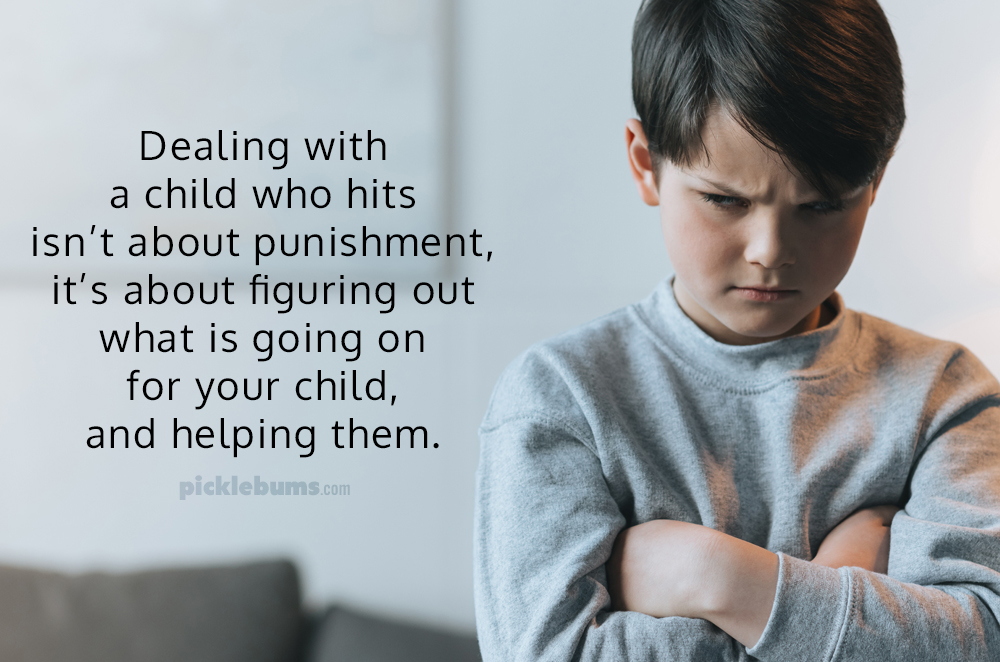
What to do when a Child Hits.
So it’s all well and good to spend time working out why your child hits, but what do we do, in the moment, when our child is lashing out?
A good way to deal with a child hitting in the moment is to have a positive first response already figured out. Follow these simple steps to deal with a child hitting in a positive way:
- Be there.
If you see your child lash out, step in and be there, physically. Usually that just involves you moving towards the children and being physically close, but sometimes you might have to put your arm out, or even physically block an action, but do so as gently and non-confrontationally as possible. - Explain the situation.
This is a simple, but really powerful action – simply say what you see without judgment.
“You hit your brother, you seem really mad, and your brother is crying.”
“You both want that toy, you both seem mad, and you hit him.”
This helps your child understand the situation, and understand that you are there to help, not judge. - Offer an Alternative
Give your child ideas for another way to manage the situation. Give them the words to tell the other person they are frustrated or angry. Give them ideas for how to take turns or how to resolve the conflict so everyone wins. Give them an alternative way to express their frustration and get their anger out of their bodies without hurting someone else – punch a pillow, throw a ball at a rebound net, run around outside.
These steps don’t work perfectly every time, but the more you use them with your kids the more effective they will be. Your kids will know that while you are not going to punish them or shame them for hitting, you are also not going to accept that behaviour. They will learn that your will be there it help them do better, rather than make them feel worse.
How to Help a Child Stop Hitting
While the steps above are great to use in the moment, the long term goal is to prevent your child from hitting in the first place. What we want is to teach our children more positive ways to express and manage their big emotions so hitting never (or at least rarely) happens. To do that we need to work on teaching our kids skills and strategies to use before they get to hitting.
Most kids don’t want to hit, most feel bad about their actions, so once you’ve worked out the reasons your child might be hitting you can work with them to come up with some strategies to avoid it.
If your child is lashing out because of anger and frustration come up with some ideas for ways they can get their anger out of their bodies in a positive way:
Set up a punching bag or pillow they can hit instead.
Throw or kick a ball against a wall or rebound net.
Get a stress ball they can squeeze, or even scrunch up some paper.
Encourage them to go for a run or jump on the trampoline or do something else physical to release the sensations.
If your child is lashing out because they are struggling to communicate their needs give them some words and phrases they can use in common situations:
If they want a turn of a toy they can say “Can please I have a turn when you are finished?”
If their feelings have been hurt they can say “You made me feel really sad/angry/scared”
If they are feeling really angry they can say “I am feeling SO ANGRY right now!”
If your child is lashing out because they feel powerless or overwhelmed teach them how to move away or ask for help:
If they are feeling frustrated by a situation they can ask and adult for help “Can you please help me deal with this before I get too angry?”
If they are feeling overwhelmed set up a safe space they can retreat to such as their bedroom, or a sensory area where they can be alone.
Help your kids learn how to negotiate so everyone wins.
These strategies are not going to be second nature, and a child is not immediately going to remember them and implement them when they are angry, so the aim of the game is for you to help them. That means when you see or hear them getting to the point of lashing out, you need to step in prompt them before things get out of hand.
And don’t forget to notice when your child managed their anger well and doesn’t lash out.
Notice and say out loud when you see your child handling frustration well. Tell them how great it is that they were able to negotiate a win win situation for everyone. Tell them how great it is to see them using the pushing bag when they are feeling frustrated. Tell them you are pleased they came to you to ask for help before things go out of control. Make it your goal to point out when they are using the strategies you came up with together, and they will be better able to remember and use those strategies in the future.
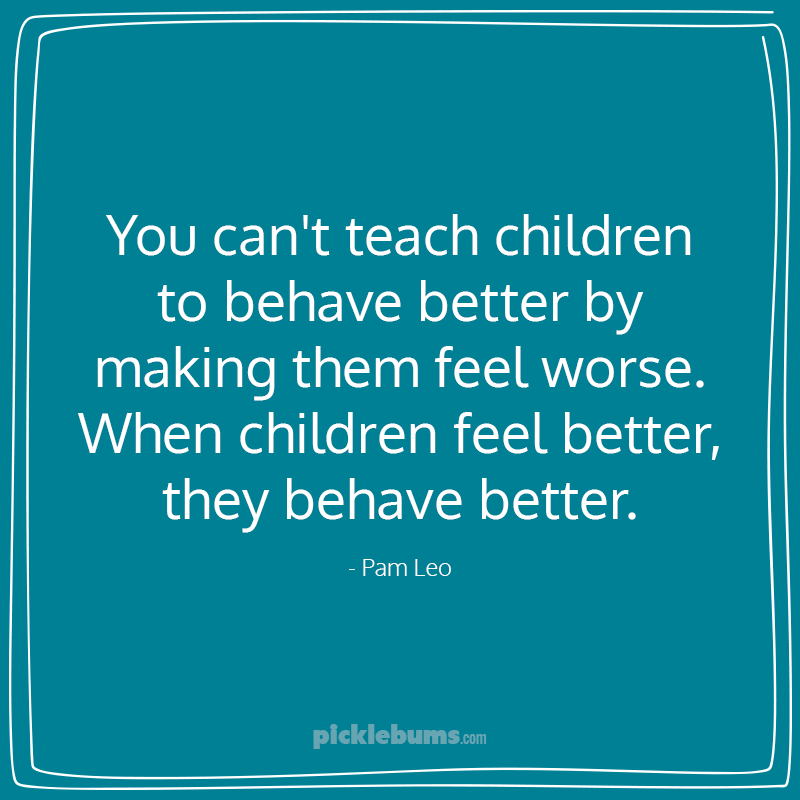
What to do After a Child has Hit Another?
So all your strategies have failed and someone has lashed out, how do you deal with it after a child has hurt another?
I think that depends on the age of the children, but at any age the first thing to do is make sure the child who has been hit is ok and is safe.
Once you have made sure the hitting has stopped and the other child is ok, offer comfort to anyone who needs it – that includes the child who has hit.
Your aim is to help both children feel safe, and shaming or punishing the child who has lashed out makes them feel worse, doesn’t teach them how to do better, and sets them up for another incident down the track.
Forcing the hitter to say sorry is also a shaming technique and doesn’t achieve anything (a forced sorry means nothing to either party) but older children can learn about restitution. They may be able to apologise or make things right after the incident by offering an alternative activity, or a hug, or whatever works for both children, but they might need time to calm down and work through the situation. Moving away can itself be a form or restitution as the child recognises they can’t be in that space at that time.
What strategies have you used to help a child who hits?
Of course these ideas are not the only things you can do to help a child who lashes out. These are just some of the ideas I have used with some success. Every child is different, and every family is different so you might need to take a totally different tack to help your child, but the one thing I feel strongly about is that this is about helping a child learn to deal with these big emotions, not shaming them, punishing them, or using violence towards them.
More Parenting Tips and Hacks.
If you are struggling with how to manage your kids big emotions in a more gentle and responsive way that focusses on connection and learning rather than shame and punishment, these articles may help.
Ok, you lost your cool and yelled at your kids, what can you do after you’ve yelled to make things better?
Try these practical strategies to use the next time your child has a tantrum or meltdown.

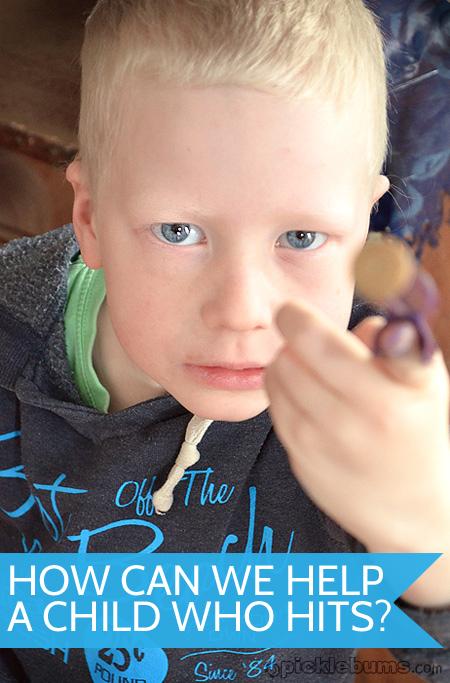
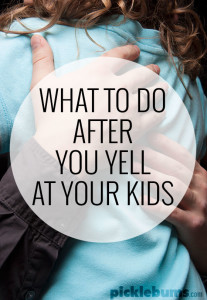
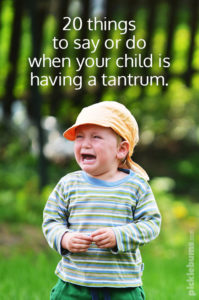
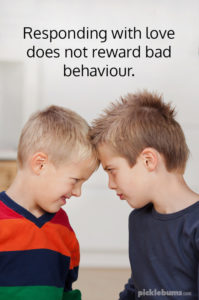
My daughter will hit a pillow instead. We sing a song about how we don’t hit living creatures. Short songs really help her remember good behavior. I’ve noticed that lots of exercise cuts down on frustration a lot. And depending on the age and maturity of the kid, yoga and meditation can help too.
My 5 year old has started hitting and kicking and lashing out at me. I haven’t changed my parenting. He started 2 weeks ago and he does it when I tell him he needs to clean up his toys or to stop throwing them in the house. What normally happened was he would get upset scream and take the toys to his room. Now he gets in my face hits or kicks me and tells me he’s the boss. I have no idea what to do. He may be 5 but my health condition actually causes his hitting to hurt 20x worse then it should.
My question/problem is my 3yo always hits, kicks, and picks on our dog. my dog has always been very patient with him but now he’s getting annoyed and lightly bites him to show he’s not happy. we try and get my son to play games nicely with him, or do something else, we have tried talking to him and telling him it hurts or he doesn’t like it, and i’ve tried showing him how it feels and showing him the appropriate way to play with or touch the dog. i’m at my wits end and don’t know what else to do.
Hi! This article has been enlightening. However, my GRANDAUGHTER is barely 13 mos old, very active, ahead of her milestones, walked at seven mos, already off bottle, starting to tell us when diaper is wet or soiled, and super intelligent! I may be biased bc my first and only, for the moment, grand baby.
My son, his fiancé, and my sweet gbaby live in an apt attached to our home. MY QUESTION IS; since she was little she has hit or tried to hit, she has started now to throw tantrums when corrected or disciplined whichever include: kicking, screaming, hitting, throwing self backwards, yelling when she walks away. Since she’s not very verbal yet, she can’t @talkback” intgw traditional way-so she walks off or when one if us walk off, she’ll like at you, scrunch her face and scream angrily at you. We are not the typical “time out” type, we do believe in spanking; but I also believe she’s too young for that. I made alotif mistakes with spanking by REACTING TO kids’ behavior. I don’t want to spank her. Her mom “pops her” mouth when she screams-not violently-but it still just bothers me!! This child literally started behavior on her first birthday. It’s like terrible twos came a year early!??
Pls help!! I take care of her about a good 89% of the time. How do you do time out? What stuff can I do to help baby use words instead
My 4 year old boy hits all the time. When he’s mad, happy, sad. It’s his go to move. He will run up and just hit people. Started at 3 years old. My husband thinks there’s something wrong with him. Going to take him to a doctor.
Thank you so much for this article. I struggle with a very aggressive three year old girl. She is incredibly smart and very loving, but her anger often scares me and worries her grandma, who is her primary caregiver when I work. It frustrates my mom SO much and she often blames me for her bad behavior. I am a “part time” single mom (separated, but working on it with my husband), and my mom thinks its because she’s often confused about whats going on with her father and I. Admittedly, I also do not deal well with my frustrations, but I know a lot of her behavior is the age and testing limits (in addition to my own parenting mistakes…) I have been working with her on using her words instead of yelling, hitting, temper tantrums etc. My mother went as far as to say my little one already needed to be in therapy because of the mistakes I have made and her aggression, which was very hurtful (because I of course love my little one and do the very best I can in ALL areas when it comes to her). This article made me feel like there was hope to correct the mistakes I have already made…because some days the damage feels irreversible. I also appreciate all the mommys who commented on this post regarding their own struggles with aggressive little ones. It’s wonderful to feel not alone and that we all don’t have it “all together” all the time. Thank you for your honesty ladies, motherhood can be lonely some days and it’s nice to know I am not the only one struggling with this issues. I feel if we were all a little more honest about the struggles (AND JOYS!) that motherhood often brings we would all feel a little less crazy and defeated. Hugs to you all. I needed to read this today.
thanks for the post, I often come to site and read diff articles on parenting it has helped me a lot and I have changed some of my ways in dealing with my kids and have had positive results :)
thank you so much
i have two boys, a 3 yr old and a 4 1/2 year old…they have a love, fight, love relationship which I’m sure it the norm for most siblings. Recently the 3 yr old began hitting his brother or bawling up his fist and has even raise his arm to me, he knows better than to actually strike me I think lol…I’ve tried to keep him to take a deep breathe or give himself a time out so he can calm down and come back expressing his frustrations appropriately. Today he hit his brother so I asked him to go sit against a wall in the same area as us and calm down…he kept saying I’m angry and hitting the wall…I realized having him sit there wasn’t working….I took him to another room and sat him on my lap…I asked him what was wrong and why he hit his brother – he said I’m angry – I said ok why are you angry – he said I don’t know I’m just angry – you could tell he didn’t know how to articulate why he was so upset.i hugged him and told him I was sorry he was feeling angry and that while it’s ok to be angry it’s not ok to hit his brother. He said ok but I’m still angry – I said ok why don’t we throw that anger away as far away as we can and maybe that will help you feel happy again….so he acted like he was throwing something away really far away….after he did that I said how do you feel..he said I’m still angry…I said ok let’s grab some sunshine and kindness and place it in our heart – so he reached high in the air and scooped the air and put his hand to his heart – I said how do you feel now? He said I feel happy mommy and was smiling and giggling. I said ok why don’t you go share that happiness and kindness with your brother and tell him you’re sorry for hitting him. He went and hugged his brother and said I’m sorry and put his hand from his heart to his brother and said here’s some sunshine and kindness. My heart melted!!
Sounds like you are doing a great job of helping your kids deal with big feelings!! :)
This is very helpful! Thanks :)